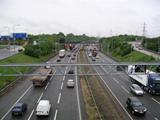Think tank Policy Exchange has warned that hitting carbon targets will leave an annual hole in tax receipts of between £9 billion and £23bn by 2030.
In its Driving Down Emissions report, the organisation also says the Government must take more action now to tackle the twin problems of greenhouse gas emissions and air pollution from road transport.
It says total greenhouse gas emissions from road transport have increased by 1% since 1990, whilst nitrogen dioxide levels exceed legal and healthy limits in Greater London and 74 other local authorities across the country.
The report says that while new vehicles are getting cleaner and more efficient, they are being driven more: motorists covered a total of 320 billion vehicle miles in Britain in 2016 alone.
Van traffic has increased 89% since 1990, in part due to the growth in home deliveries and online shopping.
However, the report finds that there is no overarching strategy to deliver the required reductions in vehicle emissions, and it is unclear who across Government is in charge.
Policy Exchange says it appears that the Government has failed fully to appreciate the fiscal implications of cleaning up road transport.
The Office for Budgetary Responsibility has suggested that fuel duty receipts could increase from the current £28 billion per year to reach circa £40 billion by 2030.
However, Policy Exchange analysis suggests that if the UK meets legislated carbon targets, then fuel duty tax receipts would be £17-31 billion in 2030 – or £9-23 billion lower than the OBR is assuming.
The cumulative impact on fuel duty receipts could be as much as £170 billion between now and 2030.
The organisation gives one of the reasons for this discrepancy is that the OBR and Department for Transport are working off completely different projections for road transport emissions than the Committee on Climate Change.
None of dft’s scenarios achieve the emissions targets suggested by the Committee on Climate Change.
Richard Howard, Policy Exchange’s head of energy and environment and the lead author of the report, said: “The new Government needs to take more assertive action to address the twin problems of carbon emissions and air pollution from road use.
“As it stands, there is no overarching Government strategy to deliver the required reduction in greenhouse gas emissions, and the latest plan to reduce nox emissions is inadequate.
“Our new report sets out the options to clean up road transport – from new technologies like electric, hydrogen and natural gas vehicles, to making conventional vehicles more efficient and encouraging people to take public transport.
“We believe that the best way forward is to adopt a technology neutral approach across the range of technologies available.
“We welcome the Queen’s Speech commitment to improve electric charging infrastructure, but further thinking is needed on how to ensure that electric charging is ‘smart’ in order to minimise network and power system issues.â€
He added: “The Government needs to ensure that consumers remain at the heart of the new strategy to clean up road transport and avoid unduly penalising motorists.
“It would be morally unacceptable for the Government to heavily penalise diesel drivers who were actively encouraged to switch to diesel by previous Governments.
“This is why we need a diesel scrappage scheme alongside other measures to promote cleaner vehicles.
“The Government needs to recognise the fiscal implications of cleaning up road transport. Our analysis suggests that if carbon targets are met, fuel duty receipts could be £9-23 billion lower in 2030 than the Government is currently assuming.â€
Policy Exchange is calling on the Government to:
Provide clear leadership. The Government needs to develop a new strategy to clean up road transport and deliver the carbon targets set out in the Fifth Carbon Budget. At the same time, there needs to be closer integration between policies to reduce greenhouse gas emissions and policies to clean up air pollution.
Put consumers first. Motorists should not be unduly penalised for the vehicles they have bought in good faith. We reiterate our call for a diesel scrappage scheme to take more polluting vehicles off the road.
Let the market decide. The Government should scrap the European target for 10% renewable transport fuels by 2020 and avoid setting targets for the number of ultra-low emission vehicles on the road. The uptake of ultra-low emissions vehicles should be decided by market forces rather than government decree.
Ensure value for money. The Government should signal a phase out of grants for Battery Electric Vehicles and Plug-In Hybrids by the early 2020s, by which time they are expected to be cost competitive with conventional vehicles.
Develop a new system for rating vehicle emissions, that takes into account both tailpipe emissions and indirect emissions (e.g. From power generation). The current system is becoming increasingly inaccurate and misleading.
Tackle Infrastructure System Challenges: Cleaning up road transport could have significant implications for infrastructure – including transport, energy and even communications systems. Government must ensure that electric vehicle charging is smart and controllable to minimise the impacts on the power system.
Consider whether road user charging might be more effective than fuel taxes. In the long term, Government should consider moving from the current system of taxing fossil fuels and carbon emissions to a system of road user charging (e.g. Toll roads, charges per mile, or congestion charges in cities).
Â








